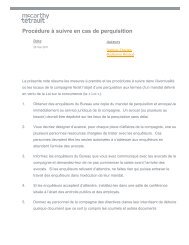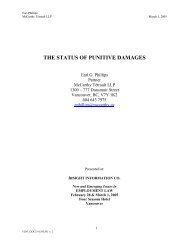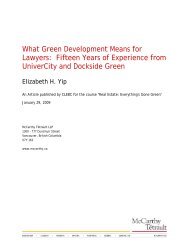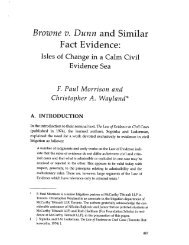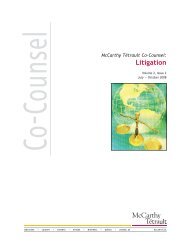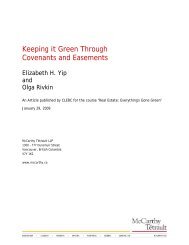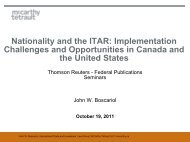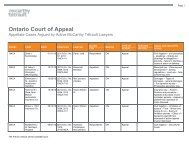The Doctrine of Public Policy in Canadian Contract Law
The Doctrine of Public Policy in Canadian Contract Law
The Doctrine of Public Policy in Canadian Contract Law
You also want an ePaper? Increase the reach of your titles
YUMPU automatically turns print PDFs into web optimized ePapers that Google loves.
26 / Annual Review <strong>of</strong> Civil Litigation<br />
called them their `understand<strong>in</strong>gs'... Surely what is immoral may be judged by<br />
the current standards <strong>of</strong> morality <strong>of</strong> the community.' 29 [emphasis added]<br />
Another type <strong>of</strong> contract which falls with<strong>in</strong> the head <strong>of</strong> "sexual immorality"<br />
is one <strong>in</strong>volv<strong>in</strong>g the provision <strong>of</strong> assistance to a prostitute. It has been<br />
held that an agreement to tender products or services to a prostitute or brothel<br />
which are <strong>in</strong>tended to be used <strong>in</strong> the pursuit <strong>of</strong> an immoral purpose is contrary<br />
to public policy,"" although where the <strong>in</strong>nocent party has no knowledge that<br />
such products will be used for prostitution, the contract is still enforceable.<br />
<strong>Contract</strong>s <strong>in</strong>volv<strong>in</strong>g the sale or bailment <strong>of</strong> necessities to a prostitute are also<br />
enforceable,"' provided there is no "evidence specifically to connect the contract<br />
with the prostitution."'" Despite such caveats, it would appear that the<br />
courts will still refuse to enforce contracts which promote prostitution."3<br />
Although, as noted above, the general academic consensus with respect<br />
to immoral contracts is that "the law <strong>in</strong> this connection appears to concern itself<br />
only with what is sexually reprehensible,"" it seems appropriate to treat the<br />
recent emergence <strong>of</strong> discrim<strong>in</strong>ation as a head <strong>of</strong> public policy that falls with<strong>in</strong><br />
the general category <strong>of</strong> immorality. As late as 1948, <strong>in</strong> the case <strong>of</strong> Noble, it was<br />
held by the Ontario Court <strong>of</strong> Appeal that a restrictive covenant accompany<strong>in</strong>g<br />
the sale <strong>of</strong> land <strong>in</strong> a summer resort which prohibited its subsequent transfer to<br />
a person <strong>of</strong> "Jewish, Hebrew, Semitic, Negro or coloured race or blood" was<br />
valid hav<strong>in</strong>g regard to public policy.'35 However, this position seems to have<br />
reversed itself, as the Ontario Court <strong>of</strong> Appeal held <strong>in</strong> the 1990 decision <strong>of</strong><br />
Canada Trust that a condition <strong>in</strong> a scholarship trust which excluded applicants<br />
who were not "Christians <strong>of</strong> the White Race" was, <strong>in</strong> fact, contrary to public<br />
policy. Similar decisions may be found <strong>in</strong> England (where it was held that the<br />
actions <strong>of</strong> a trade association <strong>in</strong> refus<strong>in</strong>g membership to a woman were contrary<br />
129 [1973] Qd.R. 93 (S.C.) at 102 and 104. Similar reason<strong>in</strong>g was applied <strong>in</strong> Armhouse Lee<br />
Ltd. v. Chappell, <strong>The</strong> Times (7 August 1996) (Eng. C.A.), where the Court decl<strong>in</strong>ed to<br />
f<strong>in</strong>d that a contract which bound the respondent to pay for certa<strong>in</strong> telephone sex advertisements<br />
was so immoral that it should be declared contrary to public policy. Note,<br />
however, that such agreements may still potentially <strong>in</strong>fr<strong>in</strong>ge the obscenity provisions <strong>of</strong><br />
the Crim<strong>in</strong>al Code, R.S.C. 1985, c. C-46, and thus be <strong>in</strong>validated on the basis <strong>of</strong> statutory<br />
illegality.<br />
130 Pearce v. Brooks (1866), L.R. 1 Ex. 213 (Eng. Exch.). See also Dom<strong>in</strong>ion Fire Insurance<br />
v. Nakata (1915), 52 S.C.R. 294.<br />
131 Bowty v. Bennet (1808), 1 Camp. 348.<br />
132 Chitty, supra note 6, at 977.<br />
133 Armhouse Lee Ltd. v. Chappell, <strong>The</strong> Times (7 August 1996) (Eng. C.A.). For a contrary<br />
view, see Judd, supra note 19 at 691-692. Such contracts may also be <strong>in</strong>valid on the<br />
basis <strong>of</strong> statutory illegality given s. 213 <strong>of</strong> the Crim<strong>in</strong>al Code.<br />
134 Cheshire, supra note 7 at 413.<br />
135 See also Clayton v. Ramsden, [1943] A.C. 320 (H.L.). An early decision to the contrary<br />
may be found <strong>in</strong> Wren, Re, [1945] O.R. 778, 1945 CarswellOnt 62 (H.C.J.) at paras. 20-<br />
23.



